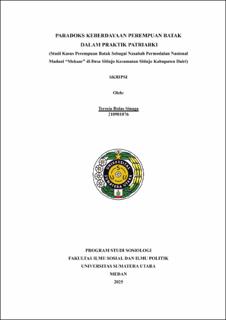Paradoks Keberdayaan Perempuan Batak dalam Praktik Patriarki (Studi Kasus Perempuan Batak sebagai Nasabah Permodalan Nasional Madani “Mekaar” di Desa Sitinjo Kecamatan Sitinjo Kabupaten Dairi)
The Paradox of Batak Women's Empowerment in Patriarchal Practices (A Case Study of Batak Women as Beneficiaries of the Permodalan Nasional Madani “Mekaar” Program in Sitinjo Village, Sitinjo Subdistrict, Dairi Regency)
Abstract
This study aims to examine the forms of disempowerment experienced by Batak women in Sitinjo village within the context of patriarchal practices, as a manifestation of the paradox of women’s empowerment involved in the economic empowerment program of PT Permodalan Nasional Madani (PNM) Mekaar. The research focuses on the mismatch between increased economic access for women through the microcredit program and the persistence of patriarchal structures that limit the socio-cultural transformation of women. A qualitative case study method was employed, utilizing a participatory rural appraisal (PRA) approach and the Harvard gender analysis framework to gather in-depth data through focus group discussions and interviews. The findings reveal that although the PNM Mekaar program successfully expanded women’s access to capital and enhanced their economic contribution (power to) within the family, it has yet to penetrate the patriarchal structures that underpin their disempowerment. Forms of disempowerment identified include weak control over economic resources, limited roles in decision-making related to Mekaar loans, management of agricultural land, husband’s income, as well as the burden of double workloads and excessive working hours. These factors are reinforced by the legitimacy of the Batak customary inheritance system and the strong social status of boru ni raja. The study found that women’s awareness of capital use is primarily directed toward economic improvement rather than acting as agents of change against injustice, coupled with their weak influence in equitable decision-making. Thus, the economic contributions of women through the Mekaar empowerment program have not significantly dismantled gender injustice and the structural disempowerment that binds Batak women in Sitinjo village.
Collections
- Undergraduate Theses [1042]

